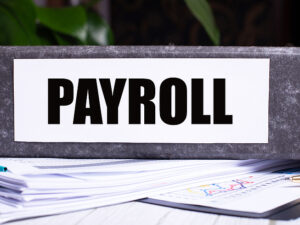Avoid Personal Liability for Unpaid Federal Payroll Taxes
Sep 03, 2020

During the COVID-19 pandemic, some cash-strapped employers may fail to pay federal income and employment taxes that were withheld from employee paychecks to the U.S. Treasury. In the eyes of the IRS, this is a major tax faux pas — punishable with a whopping 100% penalty against any responsible person.
In other words, the entire unpaid federal payroll tax amount can be assessed as a penalty against a responsible person or several responsible persons. The logic behind the 100% penalty is that the federal government should be able to collect withheld, but unpaid, federal payroll taxes from unscrupulous individuals who had control over an employer’s finances.
While that may seem fair in theory, it doesn’t take much to be classified as a responsible person who’s exposed to the 100% penalty. Proof of unscrupulousness may not necessarily be required. Here’s the story.
Who’s Considered a Responsible Person?
The 100% penalty can be assessed only against a so-called “responsible person.” That could be:
- A shareholder, director, officer, or employee of a corporation,
- A partner or employee of a partnership, or
- A member (owner) or employee of a multi-member limited liability company (LLC).
The 100% penalty can also be assessed against an employee of a sole proprietorship or an employee of a single-member (one owner) LLC.
To be hit with the 100% penalty, an individual must meet the following two criteria:
-
- Be responsible for collecting, accounting for, and paying over withheld federal taxes, and
- Willfully fail to pay over those taxes.
The IRS will look first at individuals who have check-signing authority. However, you can’t deflect responsible-person status by simply assigning signature authority over bank accounts to someone else. To determine responsible-person status, the IRS also may consider whether the individual:
- Is an officer or director,
- Owns shares or possesses an entrepreneurial stake in the company,
- Is active in the management of day-to-day affairs of the company,
- Has the ability to hire and fire employees,
- Makes decisions regarding which, when, and in what order outstanding debts or taxes will be paid, and
- Exercises daily control over bank accounts and records of disbursements.
In certain circumstances, outside parties — such as lenders, attorneys and accountants — can also be responsible persons.
For example, a tax attorney who actively participated in managing the finances of several corporations in which he had invested was found to be a responsible person. He also had check-signing authority and previously exercised his authority as a corporate officer to correct the corporation’s failure to pay over employment taxes.
When Do Insiders Qualify as Responsible Persons?
Situations involving outsiders are the exception, not the norm. In most cases, the 100% penalty is assessed against people inside the company.
For example, a corporation’s newly hired CFO became aware that the company was several years behind on its payroll taxes and notified the company’s CEO of the situation. The CFO and CEO then informed the company’s board of directors.
Although the company apparently had sufficient funds to pay the taxes, no payments were made. After the CFO and CEO were both fired, the IRS assessed the 100% penalty against them both for withheld but unpaid taxes that accrued during their tenures.
In another case, the IRS ruled that a volunteer member of a charitable organization’s board of trustees was a responsible person. Why? The volunteer had 1) knowledge of the organization’s tax delinquency, and 2) the authority to decide whether to pay the taxes.
Likewise, the president of a daycare center’s board of directors was found to be a responsible person — even though he wasn’t paid for his work and wasn’t involved in day-to-day operations. The factors that led to that determination: He secured loans for the center, directed its tax payments and reviewed its financial reports.
What Payroll Tax Relief Was Provided by the CARES Act?
Thankfully, the Coronavirus Aid, Relief and Economic Security (CARES) Act grants some meaningful federal payroll tax relief for this year. It allows employers to defer the 6.2% employer portion of the Social Security tax component of FICA tax owed on the first $137,700 of an employee’s 2020 wages.
The deferral applies to wages paid during the deferral period, which began on March 27, 2020, and will end on December 31, 2020. The employer must then pay the deferred payroll tax amount in two installments:
- Half by December 31, 2021, and
- The remaining half by December 31, 2022.
This payroll tax deferral deal is available to all employers — small and large alike — with no requirement to show any specific COVID-19-related financial distress.
Does the 100% Penalty Apply to Self-Employed People?
If you’re self-employed, you’re not exposed to the 100% penalty issue unless you have employees. But you’re effectively exposed to a 100% penalty for any unpaid federal self-employment (SE) tax. Plus, you’ll be hit with an interest charge penalty if your quarterly estimated federal income tax payments don’t cover your SE tax bill.
Under the CARES Act, self-employed people can defer half of the 12.4% Social Security tax component of the SE tax for the deferral period, which began on March 27, 2020, and will end on December 31, 2020. The 12.4% Social Security tax hits the first $137,700 of 2020 net SE income.
Self-employed individuals must pay the deferred SE tax amount in two installments:
-
- Half by December 31, 2021, and
- The remaining half by December 31, 2022.
For More Information
When you participate in running an organization that hasn’t paid over federal payroll taxes that were withheld from employee paychecks, you run the risk of the IRS classifying you as a responsible person. If that happens, you could personally be assessed a 100% penalty.
Consult Kirsch CPA Group at 513-858-6040 about what records you should be keeping and what actions you should be taking (or not taking) to avoid exposure to the 100% penalty.
Sign Up for Email Updates
Accounting & Financial News

Small Business Owners: Beware of Common Payroll Blunders
Managing payroll can be a major challenge for small business owners, especially as state and federal payroll…





